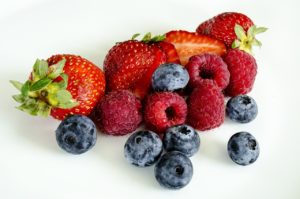10% of the US population is low in iron. You need to be vigilant about getting enough iron if you have irritable bowel syndrome and are on the low Fodmap diet. It’s not that hard but you have to make sure you are getting it from sources that are easily absorbed and that you are not hindering its absorption by combining foods incorrectly. Watch this video to learn more about how to do this efficiently.
Transcription of “The Importance of Iron”
Have you felt exhausted lately? Even though you think you’re fit, just walking up a flight of stairs leaves you pretty tired or winded. Well, you could be lacking an iron, especially if you’re a woman.
Iron is a very important element of your diet. It produces hemoglobin in the blood and hemoglobin is the substance in the red blood cells that carries the oxygen from your lungs to transport it all right around your body. Low iron is the most common nutritional deficiency in the US. Almost 10% of women are iron-deficient. And this deficiency is called an iron deficiency anemia. Without healthy red blood cells, your body can’t get enough oxygen, and if you’re not getting enough oxygen in your body, you’re going to be exhausted. That exhaustion can affect everything from your brain function to your immune system’s ability to fight off infections and disease and so on.
So how much do you need? It really depends on your age, your gender, and your overall health. But generally, men and non-menstruating women should receive about 10 milligrams of iron daily. Menstruating or nursing women, 15 milligrams. And pregnant women, 30 milligrams daily. But if you’re a vegetarian or vegan, you might also need to take an iron supplement because the body doesn’t absorb the type of iron that’s found in plants as well as it absorbs the iron from meat. In fact, there are two sorts of iron. Heme iron, which is found in red meat, chicken and poultry, and non-heme iron, which is found in eggs, vegetables, grain, and fruit. However, while the heme iron is, as I said, easily absorbed, non-heme iron is really poorly absorbed. In fact, as little as 5% of the iron in spinach is absorbed. So you’d have to eat about two kilograms to equal just a hundred grams of red meat.
Make sure you’re getting enough vitamin C in your meals from, say, oranges or kiwi fruit, because that helps with the absorption of iron. And also avoid drinking tea at meal times because it reduces the absorption of iron. People often don’t know they have anemia until they start to get symptoms like being pale and always feeling tired. But other symptoms are shortness of breath, a fast heartbeat, cold hands and feet, brittle and spoon-shaped nails or hair loss, sores at the corner of the mouth or even a sore tongue. If you have any of those symptoms, perhaps it’s time to go and see your doctor. And in fact, a simple blood test would diagnose the different stages of iron deficiency.
It’s best, if you can, to sort your iron through eating iron-rich foods because you should really avoid iron tablets. They’re really harsh on the gut and they make constipation worse. But they can also cause both nausea and diarrhea. However, if you do need to take them, start on a low dose and then gradually increase the dose to the recommended daily amount. And that should help minimize side effects. Thank you for listening, and good-bye.




Hi Suzanne,is salmon okay with ibs? I hope you can answer as I’m very frustrated and afraid to eat anything.
Thank you
Yes, salmon is protein and we have no issue with proteins, but keep the amount low because it is high fat and fat is a gut irritant. Start with about 2 oz per meal and see how you go.
Hi Suzanne I am low in iron and am supposed to take supplements but everytime I do I develop symptoms. Do you know of an iron supplement that is recommended for ibs?
Can you perhaps try to increase your iron through food? Doctors are quick to give out supplements like this but maybe they are not necessary though do check with your health practitioner to see if in your case you could try with food.